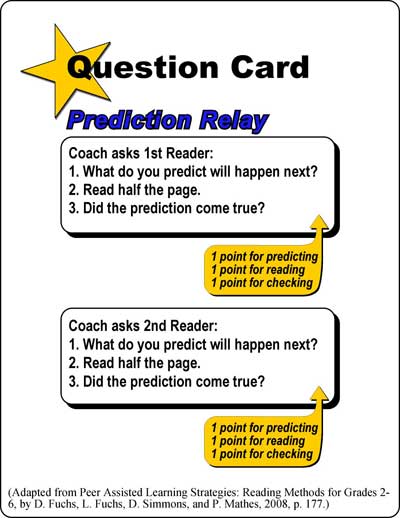What types of activities can Mrs. Nash use to increase her students’ reading skills?
Page 6: Prediction Relay
 The third and final activity in each PALS session is Prediction Relay. Mrs. Nash believes that this activity will benefit her students because the ability to make predictions is associated with improvements in reading comprehension, a skill many of her fifth-grade students appear to be struggling with. Prediction Relay consists of the three main steps outlined in the box below.
The third and final activity in each PALS session is Prediction Relay. Mrs. Nash believes that this activity will benefit her students because the ability to make predictions is associated with improvements in reading comprehension, a skill many of her fifth-grade students appear to be struggling with. Prediction Relay consists of the three main steps outlined in the box below.
| Prediction Relay (10 minutes) |
|
|
Beginning with the stronger reader, each student completes the four steps listed below and continues the process for five minutes, at which time the students switch roles. The students begin reading in the text at the point they left off in Paragraph Shrinking. Step 1. The Reader makes a prediction about what will happen on the next half page. Step 2. The Reader reads the half page. Step 3. The Reader determines whether the prediction was correct. 
View Description of Question Card This cue card enumerates the questions and directives that the Coach will need to manage the Prediction Relay activity. Coach asks the 1st Reader:
Coach asks the 2nd Reader:
Print this section
|
PALS in Action
View the movie to watch two students as they participate in a Prediction Relay activity (time: 1:08).
Transcript: Prediction Relay
First Student: What do you predict will happen next?
Second Student: I predict this will be about an emperor who likes new clothes.
First Student: Read half the page.
Second Student: “Once upon a time there was an emperor who loved clothes. He didn’t care about his army. He didn’t like to go to the theatre, and he wouldn’t even take a ride in the park unless he had a new costume to show off. He had a different suit for every hour of the day.”
First Student: Keep going.
Second Student: “The emperor lived in a big, big city. Many strangers passed through there. One day, two strangers came into town and told everyone that they were weavers and they could weave the most beautiful cloth in the world. And, what was more, they said the cloth had a magical power: It was invisible to anyone who was stupid or unfit for office.”
First Student: Stop. Did your prediction come true?
Second Student: Yes.
First Student: Summarize.
Second Student: The weavers told the king they could weave good cloth.
First Student: What do you predict will happen next?
Second Student: I predict that the emperor will let the weavers weave a new suit for him.
First Student: Read the rest of the page.
Second Student: ” ‘That cloth would be very useful to me.’ the emperor thought…”
